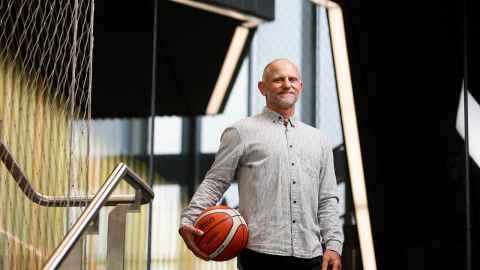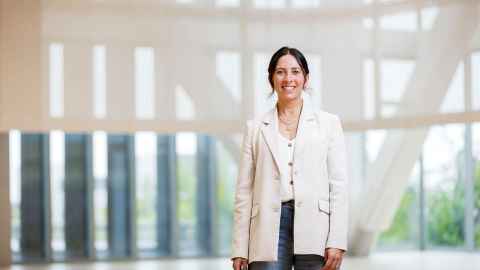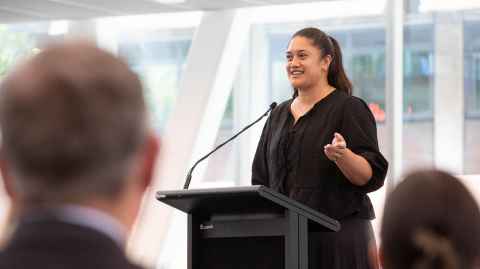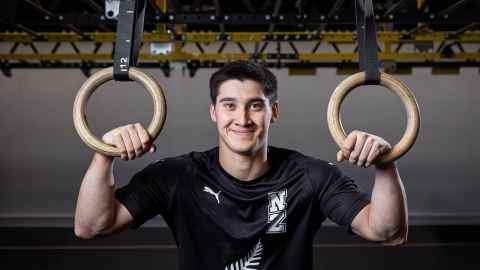Active bodies, active minds
29 May 2025
The University of Auckland’s new recreation centre signals a significant investment in students’ well-being. Owen Poland goes in search of the connections between physical activity and academic success.

A once-weekly trip to the gym might not transform your physique, but if you’re a uni student, it can noticeably impact your grades.
Research carried out by the University of Auckland’s Campus Life team found a substantial uptick in academic success among students accessing the University’s rec centre just once a week.
“You got 19 percent more A grades than all the other students who weren’t using it,” says Campus Life associate director Sean Smith, adding that those who averaged three times a week got 30 percent more A grades.
What surprised, though, was the impact rec centre use had on Māori students, whose A grades were bumped up by 24 percent based on one visit, says Sean, and a corresponding 44 percent for Pacific students.
“It’s such a huge impact that we’ve rolled out some of the things that we believe contribute to that success – including social connection, working together, being part of a team, and a sense of community,” says Sean.
Broader University initiatives include Ako – a Pacific-based study community in the halls of residence – and Toitū Tauira Māori, which holistically integrates academic and pastoral care for Māori.
“It’s more than just the activity; it’s the melting pot of social connection and collective efficacy on top of the fitness and sport,” he says.
The formation of social sports clubs has been another key initiative to enable students with varying degrees of ability to compete against each other, and more than 400 students are engaged in paid or volunteer work to help facilitate various activities.
“That sense of success and achievement through sport drives and supports academic achievement because you feel the sense of place on campus,” says Sean. “And that in turn gives you confidence in your study.”
Research has also shown that when it comes to employment, it often pays to be involved in physical activity and sport because recruiters look for students with different skill sets in addition to their top grades.
Adds Sean: “If you were involved in sport and recreation, you got hired faster, you got paid more. If you did change jobs, you’re unemployed for a much shorter time and you are actually an in-demand graduate.”
It’s more than just the activity; it’s the melting pot of social connection and collective efficacy on top of the fitness and sport.
Making a statement
The research was carried out among students attending the University’s former rec centre, and the connection it showed between physical activity and academic achievement helped support the case for the $320 million investment in Hiwa, the University’s new recreation centre.
Opened in November 2024, Hiwa (a name gifted by Ngāti Whātua Ōrākei) means vigorous, active, robust and sound. And it reflects the University’s aspirations for growth and well-being: to breathe new life into the heart of the City Campus, and stimulate and enhance the physical and academic performance of students for generations to come.
“People are expected to work harder, to strive more, and we know that the wheels may fall off for some people eventually,” says Sean. “So, it’s a big a statement from the University to say that personal well-being, moving your body and connecting with others is valuable.”
Built over eight levels, the centre includes New Zealand’s biggest gym fit-out, an aquatics hall, rooftop turf and track, three squash courts, five dedicated fitness studios, sports halls, a bouldering wall and more, in a space collaboratively designed by New Zealand and Canadian consultants.
“The big strength that the Canadians have is they’re a lot more advanced around equity, diversity, barrier-free access – and that really challenged our thinking with things like facilities for changing,” says Sean.
Accessibility is not just about reducing physical barriers, but also mental ones. With rising isolation and anxiety amongst students in higher education, around 30 percent of Hiwa is devoted to non-performance spaces – enhanced with low-level lighting, music and images of nature – to meet well-being needs. Mental health support for students is also available.
“There is a growing need for support, and part of it is there’s more openness, awareness, more people talking about their mental health. These things are out there in a way that they never used to be.”
Versatility has been another major factor in the design of Hiwa, so much so that the main swimming pool has an adjustable depth, and even the game line markings in the glass-floored sports hall can be managed remotely from an iPad.
“We’ve pushed the boat out; we’ve challenged ourselves with technology and innovation,” says Sean. “Not only will it work well for the students of today, but it also means we can evolve over time to meet users’ needs.”
Membership for students costs $200 annually and is free for those living in University halls. Around 10,000 of the University’s 46,000 students signed up as members within its first week of officially opening, says Sean, who’s in no doubt about Hiwa’s success.
“There’ll be a million visits coming through the door easily this year, and that well-being impact will be huge.”
Supporting sports stars
Among the early visitors to Hiwa were some of the University’s 267 high-performance student athletes who enjoyed a rooftop yoga session and ice bath, which sport development manager Albie Eaton says was a great way to build whanaungatanga (relationships).

“It was obviously an opportunity for them to do some health and well-being activities,” says Albie, “but also an opportunity to meet other students in the same boat, and meet our staff, and really have that sense of community and connection.”
As part of the Athlete Friendly Network, the University’s High Performance Support Programme has an MoU with High Performance Sport New Zealand in which it agrees to provide academic flexibility to help students navigate what can be a challenging study schedule. “Our role is to make sure that our students are able to do the two things that they’re really passionate about, which are sport and study,” says Albie.
Each student undergoes a needs assessment, and a tailored programme can be arranged with personal trainers and fitness staff if support is required to maintain strength and conditioning. Personal development workshops are also arranged on topics like time management, life coaching and personal relationships.
Hiwa’s central location has also provided greater visibility and face-to-face contact with students that wasn’t previously possible, not to mention the drawcard of having state-of-the art facilities, which are expected to encourage future enrolments.
“There’s more space for them to do tailored training, and the quality of the facility feels high performance,” says Albie. “Because of Hiwa, a lot of them will choose to come here.”
Hiwa has also paved the way for new partnerships with the University’s Department of Exercise Science, which Albie says is “knocking on the door” to expand its research to optimise athletic performance and drive an innovation pipeline.
“There are huge opportunities there through physiotherapy, human performance research, movement neuroscience and exercise and sport psychology.”
Fundamentally, Albie says, it’s about supporting and creating a pathway for high-performance students – predominantly 18- to 24-year-olds – who might otherwise struggle to make ends meet. “They don’t have time to work to support themselves, so we’re trying to fill the gaps for some of that government funding that has been cut across some sports, and we’re really proud of the work we do for those students,” she says.
With his eyes firmly set on qualifying for the synchronised diving event at the 2028 Los Angeles Summer Olympics, third-year Faculty of Engineering student Frazer Tavener is making the most of the opportunities presented by the High Performance Support Programme.
“That support means that I can continue my degree and make progress while still competing for New Zealand, which is fantastic,” says Frazer.
In addition to taking the stress out of managing his time between University commitments and training 25 hours a week, he says the programme also provides valuable workshops on topics like nutrition. These, in turn, create networking opportunities with other athletes.
That support means that I can continue my degree and
make progress while still competing for New Zealand, which is fantastic.
“We can talk about how they balance things. And it’s great to have other people doing something similar to me so that I can see how they do things – and vice versa.”
Hiwa will help to fill ‘gaps’ in Frazer’s 25-hour-a-week exercise regime when he has to skip training to attend labs or tutorials, and he says the centre’s three-metre diving board is ideal because it’s Olympic standard.
“I can just go and fit in a gym session around my training, around my courses, and that is extremely helpful.”
A firm believer in the connection between physical activity and academic performance, he adds: “I think it’s going to lead a lot more students to living a healthier lifestyle and, in turn, their academic quality will improve.”
Balancing the needs of being a student athlete is central to Sulu Fitzpatrick’s role as a Team Leader with High Performance Sport New Zealand, and the self-described “forever student” has had more than a few distractions during her 14-year journey toward completing a masters degree in 2025.
In addition to being a mother of twins and captain of the Northern Mystics netball team, Sulu was a Silver Ferns and Commonwealth Games representative. Her sociology thesis, she says, will highlight the experiences of the “limited pool” of Pacific women in high-performance sport.
“The focus will be to understand their journeys through high-performance sport and their challenges. If you can understand people, you can understand what their needs are and the potential approaches moving forward.”

Believing in the ‘power of the collective’, based on the world view of Pacific cultures, Sulu is using what’s called Masi methodology to centre the voices of participants so that they are able to co-produce knowledge.
“You don’t take action as an individual, you take it as a collective. And my view is that it’s the best approach for having the highest impact, but also to get that buy-in. It’s probably why I gravitated towards team sports, because that’s how team sports operate.”
And she’s full of praise for the world-class Hiwa facility that will drive home the message about the importance of education and sport.
“It offers an opportunity for students to understand the value of keeping active, and also serves as a place for high-performance athletes, or aspiring high-performance athletes, to be able to work towards that balance of being a student athlete.”
Activity for all
Most students, however, are not high-performance athletes, and for some, mental or physical health conditions or disabilities can present challenges to engaging in physical activity. Breaking down those barriers is the focus of the University’s Actively Well programme.
It draws on the te ao Māori concept of hauora (health and well-being), says programme manager Kelly Davey, taking multiple approaches – “not just from a physical point of view, but also from the social, mental and spiritual aspects, too”.
Launched in 2020, and supported in 2022 with funding through a mental health services contract, the programme has so far been accessed by more than 1,500 students. “Initially, we had a target of supporting 850 students, and we smashed that by seeing 1,200 students through the course of that initiative,” says Kelly.
Guidance and education around personalised fitness plans, nutrition, and restorative practices like diaphragmatic breathing and mindfulness are included in the offering, which is delivered in-person, online, or in groups.
“Everyone is on a different trajectory in terms of where they’re at from a physical movement capability, so we’ve got options there to suit everyone, wherever they might sit on that continuum.”
According to 2024 UK research, 50 percent of undergraduates reported a decline in mental health after they started university and Kelly acknowledges that “we live in a very stressful world right now”.
“There’s a lot of pressure when it comes to study, so it’s important for us to make sure we’ve got spaces where students can come and decompress and focus on other aspects of their total well-being.”
At Hiwa, these include a mind and body studio for low-impact classes such as yoga, Pilates and stretch, as well as a dance studio, quiet zone and chill-out areas where people can relax. Says Kelly: “Taking the opportunity to rest and digest is also crucial. So, it’s not just being physical and working on cardiovascular health, it’s also thinking about your parasympathetic nervous system.”
It’s important for us to make sure we’ve got spaces where students can
come and decompress and focus on other aspects of their total well-being.
Each University year presents new needs and challenges because the students and the pressures they face differ, says Kelly, so the ability to evolve new opportunities to be active is important.
“We see more opportunity in what we can do to help push students into other pathways that might be aligned with their preferences in terms of how they like to be active, or how they like to connect with people, or what it is that they find joy in.”
The Auckland University Students’ Association is also playing its part.
In addition to promoting various events at Hiwa during Orientation Week, like a volleyball match with the neighbouring AUT, it organises themed weeks throughout the year in collaboration with different sports clubs.
“The entire purpose of that is to bring in as many students as we can, get them active, get them running around and having a good time,” says AUSA president Gabriel Boyd.
Hiwa’s central location has ‘opened up’ the City Campus and he says it’s become a one-stop shop for students. “You could conceivably spend your entire University day studying, working out, eating and socialising in that building, which I think is really unique,” says Gabriel.
On a personal note, it’s no surprise that Gabriel is also a big fan of physical exercise, given that he’s been attending gyms from an early age, and feels the benefits of being a Hiwa regular. “I’m going to be more tuned into my lectures and be less distracted. And it also just helps the mood.”
More than half of the investment in Hiwa was paid for by student levies over many years. Given that, says Gabriel, “you would hope that it contributes positively to the average student on campus”. And he says it’s important students’ voices are heard on issues relating to its use.
“I think students should be central in all the conversations and all of the recommendations around this rec centre.”

A PLACE TO BELONG
As a participant in the High Performance Support Programme, national gymnastics champion William Fu-Allen is grateful for the “phenomenal” assistance that he’s received during his four-year journey toward achieving a Master of Science in Biology.
“The greatest thing about being a high-performance athlete at the University of Auckland is that they understand the commitment that I have.”
Help with extensions and having someone to talk to has been important, not to mention being allowed to sit an exam hours before he competed at the 2022 World Championships in Liverpool – “just that opportunity to help me compete the best that I could,” he says.
Self-funding his education has been a challenge when his sporting career requires up to 32 hours a week in the gym, so the $22,000 stipend that came with his 2024 Kupe Leadership Scholarship, funded by Grant G. Biggar, was a great help. Sponsored by a range of donors, Kupe scholarships aim to develop future leaders, offering a leadership programme, personal mentor and tuition fee support.
“I don’t think I would have been able to compete, train and complete my masters at the same time without the scholarship,” says William.
Most of William’s gymnastics training takes place off-campus because of the specialist equipment required, and while the opening of Hiwa has come at the end of his studies, he’s made good use of the weights area, pools and various spaces for decompression.
“I actually wrote part of my masters thesis in the centre because I was able to use it as a place of recovery and relaxation.”
More than that, he says Hiwa has provided a valuable sense of connection. “It’s a place where a lot of athletes like myself can come together as a group and feel like we have a place where we belong.”
This article first appeared in the Autumn 2025 issue of Ingenio.